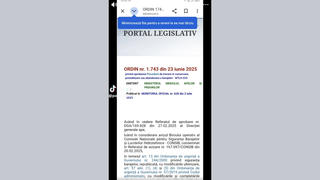
Este adevărat că un vot recent al unei comisii parlamentare din cadrul Uniunii Europene (UE) privind reglementarea monedei euro digitale ar fi dovada faptului că o astfel de lege a fost deja adoptată, lucru care va face ca cetățenii UE să piardă controlul asupra propriilor bani? Nu, nu este adevărat: ceea ce s-a votat în cadrul Comisiei Europene pentru Libertăți Civile, Justiție și Afaceri Interne este un proiect ce conține amendamente la propunerea de monedă euro digitală, acestea vizând stabilirea unei noi forme digitale a banilor din cadrul Băncii Centrale, pe lângă bancnote și moneda euro. Atât propunerea, cât și proiectul comisiei vizează reglementarea monedei euro digitale și consolidarea protecției datelor cu caracter personal. Nu există nicio dovadă a unor măsuri coercitive privind modul în care cetățenii UE ar trebui să-și folosească banii.
Afirmația a apărut într-un videoclip (arhivat aici), publicat pe TikTok la data de 16 februarie 2024, cu următorul titlu:
Mare atenție! E lege! S-a votat! Euro digital - monedă de plată!
Așa arăta postarea pe TikTok la momentul redactării acestui material:

(Sursa: captură de ecran TikTok făcută miercuri, 21 februarie 2024, ora 07:42:54 UTC)
Persoana din videoclip începe prin a spune că, "din păcate, tirania continuă", adăugând că respectivul comitet „a dat undă verde implementării monedei euro digitale". Apoi, acesta susține că „banii noștri, proprietatea personală, nu va mai fi în totalitate a noastră" și că, putând fi incluși într-un portofel digital, banii vor fi „administrați, controlați și supravegheați fie de o bancă, fie de o instituție publică de stat".
La data de 14 februarie 2024, Comisia pentru Libertăți Civile, Justiție și Afaceri Interne (LIBE) din cadrul Parlamentului European, a votat, cu 48 pentru și șase împotrivă, aprobarea proiectului (arhivat aici) cu privire la "Propunerea de regulament a Comisiei UE, al Parlamentului European și al Consiliului privind instituirea monedei euro digitale".
Propunerea Comisiei Europene (arhivată aici) face parte din pachetul de legislație europeană digitală UE, care este încă în dezvoltare. Scopul acestuia este să introducă în UE un echivalent electronic al numerarului, care să fie o completare a bancnotelor și a monedelor, și nu o înlocuire ale acestora.
Afirmația conform căreia o propunerea legislativă ar fi „tiranică" este lipsită de dovezi, deoarece atât propunerea UE, cât și opinia comisiei arată clar că moneda digitală euro ar fi o formă complementară monedei în statele UE care au adoptat euro, iar banii cash ar rămâne disponibili publicului. Proiectul modifică în mod specific un paragraf din propunerea Comisiei UE (punctul 21 din secțiune, care începe cu „Întrucât", acesta expunând motivele legii) pentru a adăuga cuvântul „în plus:"
Obiectivul principal al instituirii monedei digitale euro este utilizarea acesteia ca formă suplimentară a monedei unice cu curs legal în zona euro.
La punctul 58, propunerea mai precizează că „utilizatorii ar trebui să poată, dacă doresc acest lucru, să integreze și să autorizeze plăți cu euro digital prin utilizarea portofelelor europene de identitate digitală", dar acest mijloc nu este impus ca fiind singura opțiune.
De asemenea, nu există nicio dovadă cum că banii cetățenilor UE nu vor mai fi ai lor sau că portofelul digital va fi „controlat" de către banca sau instituțiile statului.
În expunerea sa de motive, propunerea precizează că urmărește să asigure un „nivel ridicat de confidențialitate în plățile digitale", adăugând că „euro digital nu sunt bani, care pot fi programați, și, prin urmare, aceștia nu pot fi folosiți pentru a limita cheltuielile sau pentru a-i direcționa către anumite bunuri sau servicii", că „vor fi disponibili offline cu un nivel de confidențialitate față de furnizorii de servicii de plată, care poate fi comparabil cu retragerile de bancnote de la bancomatele automate și cu utilizarea numerarului" și că „decontarea digitală a tranzacțiilor în euro vor fi concepute astfel încât nici Banca Centrală Europeană, nici băncile centrale naționale să nu poată atribui date unui utilizator digital de euro, care să poată fi identificat sau identificabil".
Alte modificări ale propunerii se referă la protecția datelor cu caracter personal, combaterea spălării de bani și crearea de acorduri între Banca Centrală Europeană și banca centrală națională a statelor membre UE, a căror monedă nu este euro, pentru a distribui, astfel, moneda euro digitală.
Lead Stories a arătat și în analize anterioare că portofelul digital al UE nu a fost creat ca o modalitate de a controla populația. Puteți citi această verificare aici.















